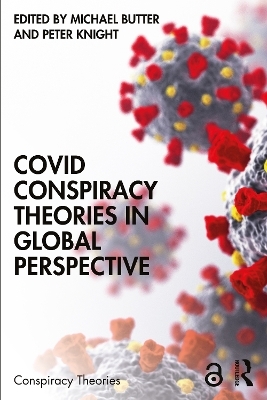
Covid Conspiracy Theories in Global Perspective
Routledge (Verlag)
978-1-032-35943-4 (ISBN)
Covid conspiracy theories have attracted considerable attention from researchers, journalists, and politicians, not least because conspiracy beliefs have the potential to negatively affect adherence to public health measures. While most of this focus has been on the United States and Western Europe, this collection provides a unique global perspective on the emergence and development of conspiracy theories through a series of case studies. The chapters have been commissioned by recognized experts on area studies and conspiracy theories.
The chapters present case studies on how Covid conspiracism has played out (some focused on a single country, others on regions), using a range of methods from a variety of disciplinary perspectives, including history, politics, sociology, anthropology, and psychology. Collectively, the authors reveal that, although there are many narratives that have spread virally, they have been adapted for different uses and take on different meanings in local contexts.
This volume makes an important contribution to the rapidly expanding field of academic conspiracy theory studies, as well as being of interest to those working in the media, regulatory agencies, and civil society organizations, who seek to better understand the problem of how and why conspiracy theories spread.
The Open Access version of this book, available at www.taylorfrancis.com, has been made available under a Creative Commons Attribution-Non Commercial-No Derivatives 4.0 license.
Michael Butter is Professor of American Studies at the University of Tübingen, Germany. He also directs the ERC-funded project "Populism and Conspiracy Theory." He is the author of The Nature of Conspiracy Theories (2020) and coeditor of the Routledge Handbook of Conspiracy Theories (2020). Peter Knight is Professor of American Studies at the University of Manchester, UK. His research is on conspiracy theories and the economic humanities. He is the author of Conspiracy Culture, The Kennedy Assassination, and Reading the Market and is co-author of Invested and Conspiracy Theories in the Time of Covid-19 . He is coeditor of the Routledge Handbook of Conspiracy Theories.
Introduction Introduction: Covid-19 Conspiracy Theories in Global Perspective Section 1: General Perspectives 1. The Psychology of Pandemic Conspiracy Theories 2. Leak or Leap? Evidence and Cognition Surrounding the Origins of the SARS-CoV-2 Virus Section 2: Asia 3. Covid Origins, Nationalism and Diasporic Heterogeneity: China, Chineseness and Covid-19 4. Dis-Spiracy Theory: Why Corona Rhymes with Corruption in Indonesia 5. Covid-19, Conspiracy Narratives, and the Arab State 6. Conspiracy Theories about the Covid-19 Pandemic in Turkey Section 3: Africa 7. Covid-19 Related Rumors and Conspiracy Theories: A Case Study from Cameroon 8. "Complòóót?": Theorizing about Covid-19 Conspiracies in Côte d’Ivoire 9. A Disease of the Rich and a Disease of the Poor: Comparing Rumors about the Coronavirus and Ebola in Guinea 10. The Constitutional Crisis and the Coronavirus: Conspiracies and Deep Politics during South Africa’s Pandemic 11. Africa Out of the Shadows: Authoritarian Anti-Imperialism, Transnational Pentecostalism, and Covid-19 "Conspiracy Theories" 12. "The Truth Is Not Known": Covid-19 Vaccine Hesitancy as a Failure of Biomedicine’s Moral Legitimacy in Zambia Section 4: Europe 13. Covid-19-related Conspiracy Theories in the Baltic States 14. Covid-19 Conspiracy Theories in France 15. Covid Conspiracy Theories in Germany, Austria and Switzerland 16. Conspiracy Entrepreneurs, Fringe Movements, and the Pervasive Style of Conspiracy during the Coronavirus Pandemic: The Case of Hungary 17. Italian Uprising from Covid Skepticism to Societal Polarization 18. The Proliferation of Alternative Media: How Corona Conspiracy Theories in the Netherlands Fostered New Social Movements 19. Covid, Conspiracy Theories and the Nordic Countries 20. The Usual Suspects? Conspiracy Theories and the Covid-19 Pandemic in Poland 21. A (Cold) War for Vaccines: Retro-Conspiracism in Kremlin-Aligned Russian Discourse on Sputnik V 22. A Communist Coup by Lockdown: Covid Conspiracy Theories in Spain Section 5: North America 23. Anti-Colonialism Meets Anti-Vax Suspicion: The Case of Guadeloupe 24. A Perfect Storm: Covid-19 Conspiracy Theories in the United States Section 6: South America 25. Vulnerability and Conspiracy Theories: Latin America in the Time of Covid-19 26. "The Communavirus Is Here": Anti-Communist Conspiracy Theories in Brazil’s Response to the Covid-19 Pandemic Section 7: Oceania 27. Covid-19 in Aotearoa New Zealand: The Darker Side of Paradise
| Erscheinungsdatum | 07.02.2023 |
|---|---|
| Reihe/Serie | Conspiracy Theories |
| Zusatzinfo | 4 Tables, black and white; 1 Line drawings, black and white; 1 Halftones, black and white; 2 Illustrations, black and white |
| Verlagsort | London |
| Sprache | englisch |
| Maße | 156 x 234 mm |
| Gewicht | 700 g |
| Themenwelt | Sachbuch/Ratgeber ► Gesundheit / Leben / Psychologie |
| Studium ► 1. Studienabschnitt (Vorklinik) ► Med. Psychologie / Soziologie | |
| Sozialwissenschaften ► Soziologie | |
| ISBN-10 | 1-032-35943-9 / 1032359439 |
| ISBN-13 | 978-1-032-35943-4 / 9781032359434 |
| Zustand | Neuware |
| Haben Sie eine Frage zum Produkt? |
aus dem Bereich


